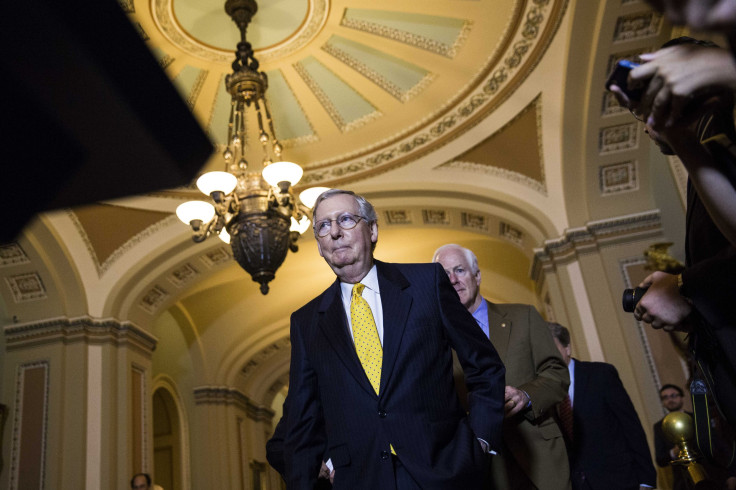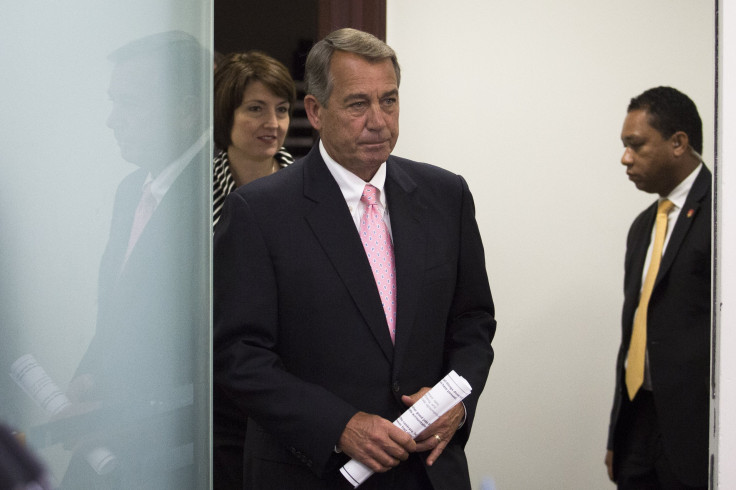Republican Civil War: Motion To Oust John Boehner, Highway Funding Fight Show GOP Infighting

WASHINGTON -- You know the GOP is dysfunctional when Senate Majority Leader Mitch McConnell has more success negotiating with Democrats than with fellow Republican John Boehner, the House Speaker. Or when Rep. Mark Meadows, a South Carolina Republican, files a motion to oust Boehner from his leadership post.
Both those things have already happened this week, and it's only Tuesday.
McConnell and California Sen. Barbara Boxer, a Democrat, negotiated a bipartisan compromise to renew the Highway Trust Fund. The funding -- which keeps the nation’s major road and bridge projects operational -- is set to expire after July 31.
Congress has long struggled with the highway bill. Lawmakers have passed more than 30 extensions in the past six years to keep the trust fund -- a series of cobbled-together funding sources and a tangle of project prioritizations. Some members have pushed to raise the federal gas tax for the first time since 1993, an option that seemed appealing with oil prices at a low. But Republicans who remain steadfast against raising any tax of any kind have pushed back.
McConnell worked hard to get the highway bill through the Senate in time for the House to take it up before the end of the week. Conservatives sought to attach a number of controversial measures, like defunding Planned Parenthood and repealing the Affordable Care Act, which would have surely sunk the compromise. McConnell fended off the so-called “poison pills.”
The Senate deal would extend the fund for another six years, and would secure funding for the next three years without raising the gas tax, giving Congress the ability to get beyond the next presidential election before having to reconcile funding again.
But instead of voting on the bill, House members decided to move their vacation up a day and leave town on Wednesday. The House is gone for the entire month of August for recess.
Boehner played down the disagreement. "Sen. McConnell and I work very closely together on a whole host of issues, but there are times when the Senate has to do what the Senate has to do and the House has to do what the House has to do," Boehner told reporters. "It doesn't happen very often. It's just happening this week."

Even so, the speaker is apparently too big a softy in the eyes of right-wingers like Meadows, a member of the conservative House Freedom Caucus. The “Speaker has, through inaction, caused the power of Congress to atrophy, thereby making Congress subservient to the Executive and Judicial branches, diminishing the voice of the American People,” says the resolution filed by Meadows, according to Politico. “Whereas the Speaker uses the power of the office to punish Members who vote according to their conscience instead of the will of the Speaker."
His motion to vacate the chair has never succeeded in removing a speaker and is unlikely to work this time. The motion needs a majority of the chamber -- meaning Democrats would have to get on board along with dissatisfied conservatives. House Minority Leader Nancy Pelosi has previously said she has no intention of participating in a coup. And most Democrats acknowledge that any replacement for Boehner would only be more troublesome for them.
The growing intensity of intraparty rifts could spell trouble for finding an agreement to avoid another government shutdown before the Oct. 1 deadline.
Right wing anger with the highway bill was based in part on it having been amended to include a renewal of the Export-Import Bank, an esoteric agency that provides loans to foreign buyers of American goods. House conservatives have made the bank a target and worked to force the bank’s expiration after July 1.
But supporters of the bank in the Senate decided to use the highway bill to renew Ex-Im’s charter. Conservatives in the House likely don’t have the votes to remove the renewal. So instead, they will simply not vote on the long-term highway bill.
Instead, the House and Senate are going to pass another short-term extension. This one will keep the highway trust funded for another three months -- and likely set up another showdown over the bank in October.
But before they can get to that, Congress is going to be tasked with a bigger order: avoiding another shutdown. The deadline to fund the government is Oct. 1 and so far Congress has passed none of the 12 spending bills needed to keep the government operating.
The House passed some of the spending bills, all on partisan lines and in forms that were sure to be vetoed by President Obama. The Senate hasn’t passed any, blocked at each attempt by Democrats who say the funding levels are too low.
Congressional aides anticipate that Congress will ultimately pass a short-term continuing resolution to keep the government funded. It could cover only a few months or even an entire year.
But even that could be tricky for Republicans if the past few fights provide any insight into the future. Conservatives are continuing to push for riders, like repealing the ACA or making changes to immigration policy. It would take only a handful of unhappy Republicans to derail the whole process. And leave the federal government in another shutdown.
© Copyright IBTimes 2024. All rights reserved.






















